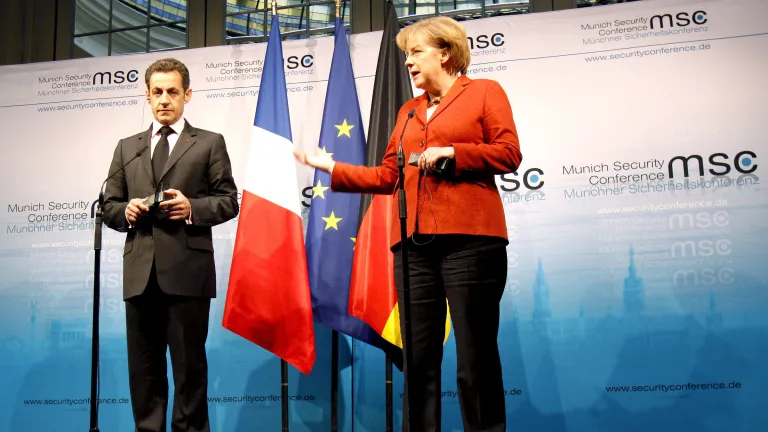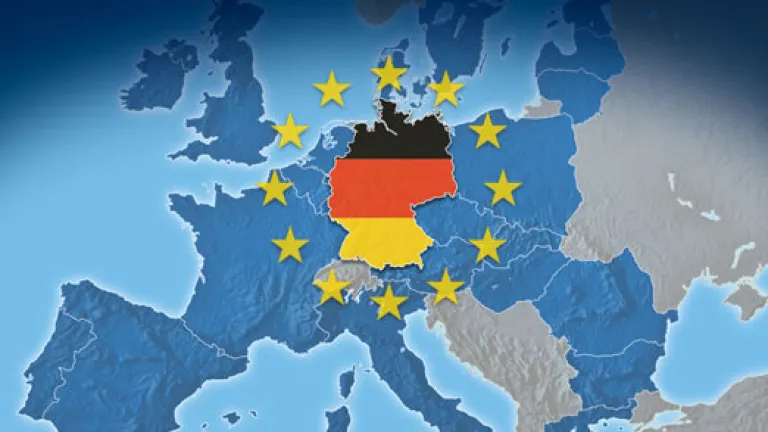Germany and the Euro: What Will Be the Ultimate Outcome?
A severe crisis often results in economic and political disaster, but it can also foster an opportunity for exercising much greater control, especially for an economically strong and dominant country like Germany. Does the Bible indicate where the current crisis (and others like it to follow) could eventually take Europe?
The euro, the shared currency of 16 nations in the European Union (EU), came into being some 11 years ago. But the economic and monetary union it represents has met with a dire situation, calling the currency's survival into question.
A former president of the European Commission, Romano Prodi, recently declared: "When the euro was born, everyone knew that sooner or later a crisis would occur. It was inevitable that, for such a bold and unprecedented project, in some countries mistakes would be made and unforeseeable events occur" (Financial Times, May 21, 2010).
As with any chain, that of the euro is only as strong as its weakest link—which in this case turned out to be Greece.
Heavily in debt, it was in danger of default and being forced off the euro—which would lead to many investors losing confidence in other overextended eurozone countries and abandoning euro holdings. The EU and the International Monetary Fund decided to bail out Greece to maintain the eurozone and buoy up faith in the currency. And political integration has been pushed forward in order to impose stricter financial discipline on member states.
Mr. Prodi went on to say: "I was warning years ago that . . . extraordinary events could occur that would force joint co-ordination of fiscal policies. Then the Greek crisis arrived—serious in terms of the sins that caused it, but easily solvable considering the modest size of the country's economy."
Most European observers would probably take issue with his statement about an easy solution, as the situation remains precarious for Europe and the global economy. But his overall assessment about closer integration seems to be pretty much on target.
European political integration or eventual meltdown?
Daily Express columnist Leo McKinstry analyzes the current situation more bluntly: "The moment of truth has arrived for the European Union. The debt crisis has brought the single currency to the brink of meltdown. Leaders of the EU now face a stark choice.
"They can either allow the eurozone to fall apart through the withdrawal of hopelessly indebted member states such as Greece and Portugal, or ruthlessly press ahead with full economic and political unification, creating a new European nation that will impose fiscal discipline throughout its territory" (May 21, 2010, emphasis added throughout).
Hamish McRae, chief economics commentator for The Independent, offers his own assessment—embedded in the title of his recent article: "The euro should survive this crisis; but it won't get through the next one" (May 21, 2010).
A Stratfor Global Intelligence report stated: "The euro and the European Union will probably survive this crisis—although their mutual failure is not nearly as unthinkable as the Europeans would have thought even a few months ago—but this is not the only crisis Europe will experience" (May 25, 2010).
Romano Prodi, in his piece quoted above, expressed his own assessment: "We are therefore at a crossroads. The only alternative to greater co-ordination of economic policies is dissolution of the euro."
The German and British roles—and their mutual relationship
Berlin took a calculated risk by banning short selling of euro-area government sovereign credit-default swaps and 10 German financial stocks until March 2011. Whether boldly or foolishly, it made this decision unilaterally, without consulting France or any other member country of the eurozone. Though the action has invited immediate backfire, being generally condemned as ill-judged, this German government rarely acts without careful calculation.
One observer speculated about the possibility of "a smash-and-grab attack on the future of the eurozone that could transform the dynamic of the European Union" (Bill Jamieson, "Germany Pushes the Issue Too Far," The Wall Street Journal, May 21, 2010).
"'If we don't avert this danger, then the consequences for Europe are inevitable,' [German Chancellor Angela] Merkel said. 'Because if the euro is failing, then Europe is failing . . . This will all remain in place until other rules [other than those in Germany] are established on a European level'" (Andrew Thomas, "Germany's Merkel: Failure of Euro Means Failure of Europe," The Wall Street Journal, May 19, 2010). Clearly Berlin, as key paymaster for Greece and other weaker economies, expects the eurozone members to follow its leadership.
The Stratfor Global Intelligence report commented: "As we have seen during the current crisis, Germany is clearly the economic center of gravity in Europe, and this crisis has shown that the economic and political issues are very much one and the same. Unless Germany agrees, nothing can be done, and if Germany so wishes, something will be done" (May 25, 2010).
Partially through the efforts of dislodged Labour Party Prime Minister Gordon Brown (while he was still chancellor of the Exchequer), Britain has retained its pound sterling and so far avoided joining the eurozone. While on board a ferry crossing the Irish Sea from Britain to Ireland, I watched on TV the newly elected British Prime Minister David Cameron in a joint news conference with Angela Merkel, ostensibly in support of German efforts to stem the current crisis. Apparently they had a 90-minute meeting as well.
But the night before (May 20), as reported by The Guardian, Mr. Cameron had apparently confided to French President Nicolas Sarkozy, "I always had concerns about the euro on a fundamental level" (May 22, 2010). The same article states, "Cameron's footwork looked impeccable—until he used the V-word with Merkel."
During the news conference with Chancellor Merkel, Prime Minister Cameron "declared that the support of all 27 EU countries was needed to change the Lisbon Treaty to stiffen the rules for the single currency, something Merkel stressed might be necessary to revive the euro." Calling her attention to the "V-word," Cameron said: "The United Kingdom has a veto. Those are very important points to understand."
Tensions between Britain and Brussels
The new British government's plans for Europe have been summed up in a white paper published in The Daily Telegraph. It says: "Britain should play a leading role in an enlarged European Union, but no further powers should be transferred to Brussels without a referendum . . . Britain will not join the euro in this Parliament and the possibility of a United Kingdom sovereignty bill stressing the 'ultimate authority' of Parliament will be explored" (May 21, 2010).
Well-known British author Frederick Forsyth, also a columnist for the Daily Express, starkly stated: "Once again Brussels has come up with a new decree aimed at afflicting more damage on our country. Like it or not London's Square Mile absolutely dominates the world of the hedge fund [an investment fund to protect against losing money] . . . The funds generate a huge amount of wealth and they are overwhelmingly based here.
"So Brussels has come up, impelled by the Franco-German alliance, with a series of measures to cripple them . . . It is just a ploy to hound them [the hedge funds] out of London where they contribute billions to the British economy." This particular piece was titled, "Humiliating Britain Is Still Top Item of Brussels Agenda" (May 21, 2010).
John Griffing asked the question in his article in The American Thinker: "How did independent nations with separate identities and divergent cultures allow themselves to be bullied into submission by a gaggle of European bureaucrats in Brussels?"
All human aspirations and failures aside, the ultimate answer appears to lie in the fulfillment of Bible prophecy. With all of its ups and downs, and whatever the eventual fate of the euro, the European Union has set up a complex infrastructure of bureaucratic government that could well be used by a future charismatic dictator reminiscent of Adolf Hitler. According to the biblical book of Revelation, many people will actually come to worship this man and the empire over which he will rule. Scripture calls both the man and the empire "the Beast."
Jesus Christ urged His followers, "Watch therefore, and pray always that you may be counted worthy to escape all these things that will come to pass, and to stand before the Son of Man" (Luke 21:36). You need to be sure you're regularly reading The Good News to properly comprehend what we are told to watch! GN





